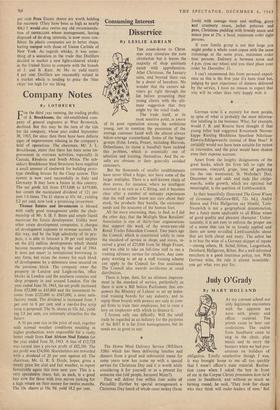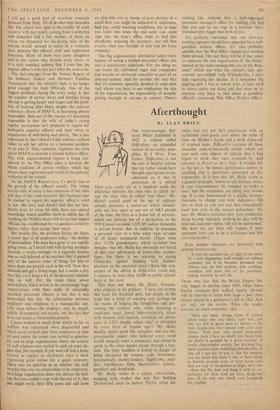Judy O'Grady
By MARY HOLLAND
still got a good deal of vicarious romantic pleasure from them. All of us who were boarders did. The school was right in the middle of army country with day pupils coming from Camberley and Aldershot and a fair number of these, on \+ hum we depended for life-giving • tales of the outside world, seemed to move in a romantic daze between the officers' club and regimental fUnctions. Many of them were army daughters and in due course they became army wives, so it is with nostalgic sadness that 1 read that the regular officer's wife just isn't what she used to be.
The fact emerges from the Annual Report of the Soldiers', Sailors' and Airmen's Families Association that the colonel's lady is no longer good enough for Judy O'Grady. One of the biggest problems facing the army today is that the number of service wives and families living abroad is getting larger and larger and the prob- lem of looking after them, despite the stalwart voluntary efforts of SSAFA, is becoming almost impossible. And one of the reasons it's becoming impossible is that the wife of today's young regular serviceman isn't prepared to regard her husband's superior officers and their wives as repositories of well-being and advice. 'She is less impressed by the Colonel's Lady and less inclined either to ask her advice on a personal problem or to take it.' One, nameless, regiment has even asked SSAFA to provide a trained welfare officer. This wild, unprecedented request is being con- sidered by the War Office since it involves the whole tradition of service welfare which has always been regimental and vested in the paternal
1 Ithority of the colonel.
As the SSAFA Report says, it's partly due to the growth of the affluent society. The young service wife of today is less conscious of her class and thus of her rank situation. Her husband may be trained to regard his superior officer's word as law. She isn't, and doesn't feel that her hus- band's boss, let alone his wife, have any special knowledge which qualifies them to advise her. If anything the Welfare State with its myriad suspect Officials has conditioned her to question authority figures rather than accept their word.
But besides this, the problem facing the Army is surely that of all employers today : the decline of paternalism. The days have gone or are rapidly going when, as I heard told with loving nostalgia recently, a works manager in a cigarette factory was so well-beloved of his workers that it seemed part of the natural order of things for him to leave them ten pounds each in his will. Now they demand and get a living wage, but it seems a pity that they can't keep a bit of the personal relation- ship as well. For the main thing about paternalism, which is lost in the increasingly huge organisations with their staffs of admirably qualified personnel officers, is not that it was benevolent but that the relationship between employer and employee is a manageable one. I Ike most fathers the employer may be stupid, selfish, ill-tempered and erratic, but the fact that he is real makes a relationship possible.
I have worked in small firms which as far as welfare was concerned were disgraceful and which never looked after their employers in time of need unless the owner was moved to generos- ity, and in large organisations where the science of staff relations was carried to such an exact de- gree that, for example, if yoti were off sick a letter arrived as regular as clockwork once a week expressing good wishes for a quick recovery. I here was no question as to whether the staff worried less over its relationship to its employers. In a large organisation there was always the feel- ing that you couldn't cope with the size of it, that You might work there fifty years and still have
no idea who was in charge of your destiny. In a small firm you might be subjected to unfairness,. bad pay, awful working conditions, but at least you knew that when the end came you could rage into the boss's office, hope to find him drunkenly seducing his secretary, and tell him exactly what you thought of him and his lousy company.
The big organisation's alternative safety-valve fantasy of seeing a trained personnel officer just isn't a satisfactory substitute. For one thing no one wants his individual rages and complaints and worries so obviously reducible to part of an abstract science. And for another the very fact that it's someone specially detailed to cope with staff whom you have to see emphasises the size of the organisation, the impossibility of actually getting through to anyone in control. There's nothing like walking into a well-organised personnel manager's office for making you feel that you and he are cogs in a machine that's immeasurably bigger than both of you. '
It's probably inevitable that one forward- looking regiment should have appealed for a well- qualified welfare officer. It's also probably sensible that the War Office should start sending them abroad. The sad thing will be if they come to represent the vast organisation of 'the Army,' instead of the more manageable one of 'the Regi- ment,' which was what the colonel's lady pre- sumably personified. J udy O'Grady-like, I can't help regretting her decline. If I remember the giggling girls I was at school with, at least we'd be sisters under our skins, and that must be an emotion very hard to feel about a qualified, officially sponsored, War Office Welfare Officer.







































 Previous page
Previous page